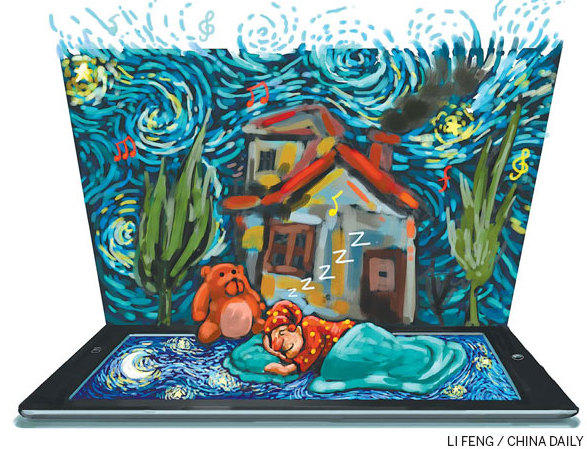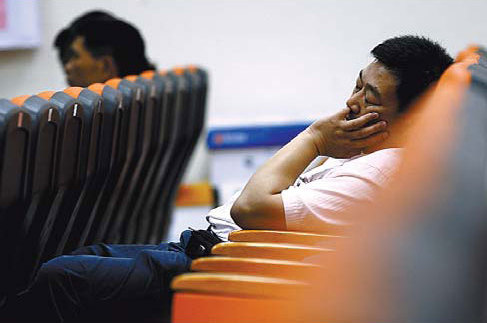Sleep appzzz ...
Updated: 2013-03-20 07:32
By Liu Zhihua (China Daily)
|
||||||||

Tired of counting sheep to make you sleep? Turn on your smartphone. Liu Zhihua says apps can help you have a good night's rest.
Sleep is important, and having trouble getting a good night's sleep can be torturous, especially for urbanites who have to deal with pressure at work all day. There are countless home cures, and we have been told to take stock of sheep hurtling over gates, or listen to adult lullabies like long orchestral works. These days, however, your friends may tell you to go to the app store instead.
Que Yuewen, 28, from Chengdu in Sichuan province, is having fun with her new sleep app. As a nurse, she has to work night shifts, and she finds it difficult to fall asleep.
She lies awake playing with her smartphone and mini-tablet and it was during one of these sleepless sessions that she decided to do a search to see if there were any apps that could help her sleep.
There were, and she decided to try one with the best reviews and positive comments.
It was an app that broadcasts soothing music and the sounds of nature. Que set the timing to 30 minutes, since it normally took her about an hour before she drifts off.
To her surprise, she woke up the next morning having no idea when she slept.
"It is amazing," Que says. "I have never fallen asleep so easily."
In fact, on both the Google Play store and Apple App store, there are hundreds of apps that claim they are designed to improve sleep, and the most popular ones have already got hundreds of thousands of favorable comments.
Some of these play simple melodies, or sounds of nature, or a calming voice, which they claim can nudge people into a relaxed state of mind and eventually lead them to sleep.
Some apps claim they adopt up-to-date research findings culled from psychology, hypnosophy or sleep science, and color science augmented by soundtracks, patterns and images that influence the brain waves, improve the sleep pattern, and make insomniacs fall into a deep and sound sleep.
Gao Guojun, 25, is another convert.
A salesman for chemical products in Dalian, Liaoning province, he started using a similar app about half a year ago on the advice of a friend. He has nothing but high praise.
Previously, Gao had a special sleep habit. He would go to bed at about 10 pm, but he would need to have the background sounds of the television on. It usually took him at least half an hour before he could go to sleep.
With the soft music from his app, he quickly falls asleep. He used to wake up the next morning weak and groggy, after a fitful night of dreams. Now, he sleeps sounder and wakes up feeling more energized.
"Being a salesman means huge work pressure and having to deal with complicated relationships," Gao says. "Both having the television on and having the app are distractions, otherwise I cannot get my mind off work. The difference is, the app seems a more efficient distraction."
Gao says many people he knows also use such apps.
Cao Zhongbo, 27, a human resources executive with a top Chinese real estate company in Beijing, says he had tried dozens of sleep-improving apps since they started appearing on the market about two years ago, but he is faithful only to a few.
Like other young urban office workers, Cao faces pressure at work, and falling asleep is always difficult. Sometimes, he lies awake until 2 am, even if he goes to bed at around midnight.
He now uses two apps to help him sleep better.
"These two have more or less some effect on me," Cao says. "But the others I've tried all proved to have exaggerated their effectiveness in their sales pitch."
However, medical experts caution that the sleepless need to consider the overall benefits before using the apps.
"There is limited data on the value of such apps," says Guo Xiheng, director of the sleep and breathing center at Beijing Chaoyang Hospital, and a council member of the Chinese Sleep Research Society.
"I believe they work more as distraction and may have more of a placebo effect."
Guo says the distracting ability of such apps is just soft music or simple, monotonous repeated sounds.
"Even if those apps are as useful as they claim, I don't think it is wise to use them," Guo says.
"Having cell phones on the bed exposes people to an electromagnetic field at close quarters and no one can say if this exposure will not cause a health risk."
Contact the writer at liuzhihua@chinadaily.com.cn.
|
Experts say fast-paced lifestyles, pressure and obesity all contribute to the country's increasing incidence rate of sleep disorders. Deng Keyi / For China Daily |
(China Daily 03/20/2013 page19)

 In Photos: 7.0-magnitude quake hits Sichuan
In Photos: 7.0-magnitude quake hits Sichuan
 Li Na on Time cover, makes influential 100 list
Li Na on Time cover, makes influential 100 list
 FBI releases photos of 2 Boston bombings suspects
FBI releases photos of 2 Boston bombings suspects
 World's wackiest hairstyles
World's wackiest hairstyles
 Sandstorms strike Northwest China
Sandstorms strike Northwest China
 Never-seen photos of Madonna on display
Never-seen photos of Madonna on display
 H7N9 outbreak linked to waterfowl migration
H7N9 outbreak linked to waterfowl migration
 Dozens feared dead in Texas plant blast
Dozens feared dead in Texas plant blast
Most Viewed
Editor's Picks

|

|

|

|

|

|
Today's Top News
Live report: 7.0-magnitude quake hits Sichuan, heavy casualties feared
Boston suspect cornered on boat
Cross-talk artist helps to spread the word
'Green' awareness levels drop in Beijing
Palace Museum spruces up
First couple on Time's list of most influential
H7N9 flu transmission studied
Trading channels 'need to broaden'
US Weekly

|

|








